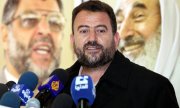What will be the fallout after Hamas leader killing?
The Lebanese Hezbollah militia has blamed Israel for the killing of Hamas leader Saleh al-Arouri in a drone attack on a Beirut suburb. Hezbollah Secretary-General Hassan Nasrallah declared that the attack would not go unanswered. There has been no confirmation of Israel's responsibility from the Israeli side. Commentators ask whether a new conflagration is looming in the region.
A string-puller
Saleh al-Arouri was the man with all the connections, La Repubblica analyses:
“With Iran, with the Lebanese Hezbollah, with the West Bank, which he wanted to bring under Hamas rule. ... Al-Arouri was the 'new' Hamas and de facto deputy to [Hamas leader] Haniyeh, the number two in the politburo. He was the theorist behind the 'convergence of arenas', a strategy aimed at eliminating the separation between the West Bank and the Gaza Strip and linking them in a broader alliance with the Shiite axis. After the 2014 rift between Hamas and Hezbollah - which were on opposite sides in the Syrian civil war - it was al-Arouri who restored relations with Tehran and [Hezbollah leader] Nasrallah.”
Open war would be a disaster
The taz questions the logic behind the killing:
“There is one thing that Israel certainly does not want: to wage war against Lebanon or even seize parts of the country. ... We can only hope that the Israeli security apparatus's prognosis was that Hezbollah would not be subject to too much pressure after the strike in Beirut and would find a back door to avoid full involvement in the war. And it is to be hoped that this prognosis is correct. An open war between Hezbollah and Israel that goes beyond constant mutual bombardment would be a disaster for both the Lebanese and Israeli populations.”
Hezbollah may just sit back and watch
It is by no means certain that Hezbollah will react harshly and swiftly, writes The Guardian:
“While Hassan Nasrallah, the Hezbollah leader, had warned that any assassination on Lebanese soil would meet 'a decisive response', reaction to Arouri's killing may not be immediate. The group needs to maintain its credibility as a major regional force, and its Iranian backers do not want to see Hamas destroyed. But Lebanese society does not want to get drawn into another war. For now, Hezbollah may continue watching Israel burn through military resources in Gaza and fuel widespread moral outrage - saving its armoury and leaving the burden of the fighting to Hamas, with additional distraction from Yemen-based Houthi forces.”
Evidence of a change of tactics
Al-Arouri's killing is a sign that Israel is adopting a new strategy, The Irish Times explains:
“Observers see signs of a shift in tactics, however, with a more focused, less indiscriminate bombing campaign, a response, they say, albeit one not acknowledged by the Israelis, to pressure from US president Joe Biden to take a more surgical approach to the war, using special forces to attack the leaders and infrastructure of Hamas. The drone attack on Tuesday on the Beirut offices of Hamas, killing several senior commanders, would appear to confirm that shift.”
Everything depends on Iran
Ultimately, Iran will decide what the consequences will be, columnist Pierre Haski comments in France Inter:
“Israel took a deliberate risk by attacking a Hamas leader abroad. This risk consists of pushing Hezbollah even further towards an all-out war with Israel, and dragging bled-out Lebanon with it. ... Is this danger real? Everything depends on Iran. Hezbollah would not initiate such a major escalation without the green light from Tehran, which provides its weapons and funding. ... Once again the Middle East is at a crucial juncture, not between war and peace, but between the Gaza war and a regional conflagration.”

